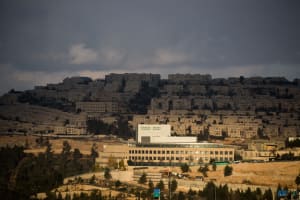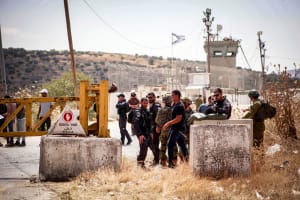IDF warns political leadership it may have to renew humanitarian aid to Gaza to comply with international law
Military clarifies it does not provide any aid to Hamas, says fight is ‘against terror organizations, not civilians’

Despite the lack of progress in hostage negotiations, the refusal of Hamas to surrender, and the uncertain situation of the military’s strategy in its renewal of hostilities in the Gaza Strip, a report in Ynet this morning says the Israel Defense Forces (IDF) will soon resume entry of humanitarian aid into the Strip.
According to Ynet, the IDF made it clear to the political leadership that a decision not to transfer food and medical aid could put commanders in the Southern Command at risk of violations of international law. The military leadership reportedly communicated this information to top members of the political echelon in recent days.
The report in Ynet says that contrary to previous strategy, in which the IDF and the Defense Ministry did not want to assume responsibility for the distribution of aid in the Strip, this time the IDF is willing to manage aid distribution to ensure the aid does not get seized by Hamas.
Following the collapse of the hostage-ceasefire deal, Israel has not allowed any humanitarian aid to enter the Gaza Strip through the crossings it controls during the past five weeks.
The defense ministry has made precise calculations of the amount of aid which entered Gaza during the first phase of the hostage-ceasefire deal, which started in January. Those calculations show that three to four times as many trucks entered per day during this period compared to during the war. However, due to the lack of IDF presence, the defense establishment believes that most aid was seized by Hamas.
The military has been conducting increased surveillance of the civilian population in the Strip in order to asses the humanitarian situation there. Sources familiar with the situation in Gaza told Ynet that “there is no famine and there is no beginning of epidemics in Gaza, but we are about 40-50 days away from a situation in which food warehouses will run out.”
The sources also told the news site that “In the past week, there have been cases in which Gazans broke into the warehouses of flour that we brought in and which passed into the control of Hamas.”
Additionally, the military assessed the renewed combat operations have increased the difficulty for many Gaza residents to obtain food and medicine due to evacuation requests and the creation of security corridors. The military believes that around 200,000 Gaza residents have evacuated from the Rafah due to operations there and in Khan Younis.
“When the intensive operation begins in Rafah, the situation will worsen and shorten the times when the population will run out of food in the areas where we will fight again,” the IDF estimated, “The humanitarian clock is ticking and it is clear that we will have to renew the aid even without international pressure.”
While the closure of several bakeries in Gaza recently was blamed on a lack of flour, the defense establishment identified the shortage of natural gas for cooking as the main issue. The IDF is currently planning a pilot operation to begin soon in the Rafah area, in which aid organizations will distribute food and medicine directly to the Gaza residents under the supervision of the military.
The military sources who spoke with Ynet said the failure of the American-Egyptian security venture at the Netzarim Corridor during the ceasefire demonstrated the need for direct IDF presence.
“It failed and proved that we must not rely on foreign companies and Egyptian elements, but only on IDF fighters," senior army officers told Ynet. “Some 20,000 registered Hamas terrorists simply bypassed the American-Egyptian barrier and returned to the northern Gaza Strip unhindered under the protection of the population. Vehicle inspections were also lacking.”
Finance Minister Bezalel Smotrich, who participated in a conference organized by Yedioth Ahronot (owners of Ynet), criticized the announcement, saying, “If this is true, it is amazing that the IDF is talking to us [the political echelon] through the media.”
He also stated that, “Not a single grain of wheat will enter the Gaza Strip.”
Senior members of the Military Advocate General's Corps recently assessed that despite the renewal of combat, the current situation in Gaza does not indicate that Israel has the legal status of an occupier, due to the continued presence of Hamas as a governing authority in the Strip, which engages in political, civil, and military activities within the enclave.
The IDF spokesman said, “The IDF regularly monitors the humanitarian situation of the civilian population in the Gaza Strip, and works in coordination with UN agencies and international organizations in the Gaza Strip to allow them to bring in aid. Throughout the war, the IDF allowed the entry of essential goods (such as food, water, and medical equipment) when there was a shortage of them. The IDF operates in accordance with international law, and directs its actions toward the terrorist organizations in the Gaza Strip and not toward the civilian population.”
Following the release of the Ynet story, the IDF clarified that it does not provide any aid to Hamas.
“Following this morning’s report about the humanitarian aid, the IDF is acting in accordance with the directives of the political echelon. Israel is not and will not be providing any aid to Hamas,” the military said.

The All Israel News Staff is a team of journalists in Israel.














